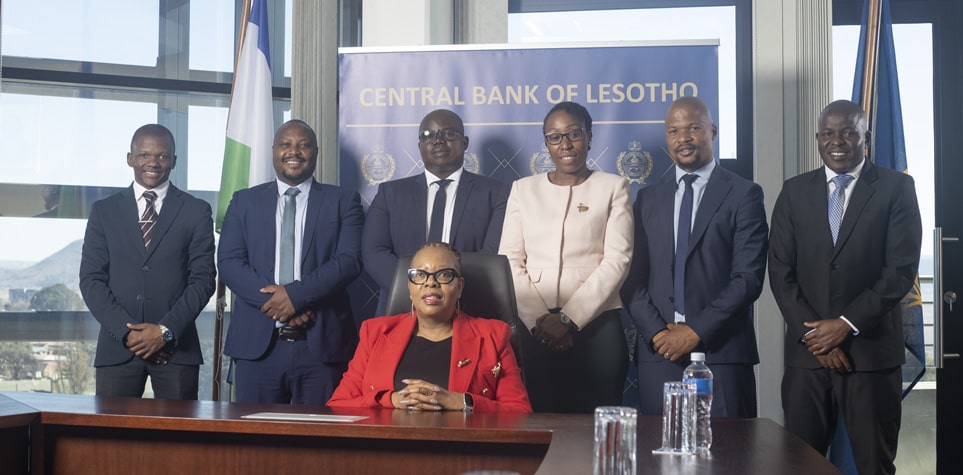The primary objective of the Central Bank of Lesotho is to achieve and maintain price stability.
The principal objective of the Central Bank of Lesotho, as stipulated in the Central Bank of Lesotho Act of 2000, is to achieve and maintain price stability. Other related objectives which are supportive to this mission are:
- Price Stability : The primary goal is to keep prices stable, ensuring that inflation remains low and predictable.
- Financial System Stability : The Bank works to maintain a healthy financial system by promoting liquidity, solvency, and proper functioning.
- Monetary Policy : It formulates and implements policies related to the country’s money supply and interest rates.
- Currency Management: The CBL issues, manages, and redeems the national currency.
- Foreign Exchange Policy : It handles foreign exchange matters to support Lesotho’s economic stability.
- Supervision and Licensing : The CBL oversees financial institutions, ensuring compliance with relevant laws.
- International Reserves : Managing official international reserves is part of its responsibilities.
- Government Support : The CBL acts as a banker and advisor to the Lesotho government.
- Payment Systems Efficiency : It promotes smooth payment operations.
- Financial System Safety : Ensuring a secure and sound financial system.
- Capital Markets Regulation : The CBL monitors and regulates capital markets of the Kingdom.
The principal objective of the Central Bank of Lesotho is to achieve and maintain price stability. To attain this goal, the Bank performs a number of functions in accordance with the modern central banking practices. An important function of the Bank is to formulate and execute monetary policy for Lesotho. Other functions include issuing of currency, serving as a banker for the Lesotho Government and the commercial banks, acting as a custodian of the country’s foreign reserves and supervision of financial institutions. It also acts as an advisor to the government on financial issues specifically, and more generally on macro-economic issues.
The primary responsibility of the Central Bank of Lesotho is formulation and implementation of the country’s monetary policy. During 2004, the Monetary Policy Committee (MPC) was established, to replace the Monetary and Exchange Policy Technical Committee (MEPTC) which had been in existence since 1998. The Committee was established upon the realisation of the need to enhance accountability and transparency of the Central Bank of Lesotho in matters related to the formulation of monetary policy in Lesotho. The Committee consists of the Governors, 2 non-executive members of the Board of Directors, one of whom shall be an economist or a person of recognised standing and experience in economics, the Principal Secretary of the Ministry of Finance and Development Planning, and a representative of the business community.
The broad responsibilities of the MPC are to:
- Review the international and domestic economic developments and their likely impact on the Central Bank of Lesotho’s ability to achieve and maintain price stability;
- Consider and formulate appropriate monetary policy responses in order to achieve and maintain price stability in the Kingdom of Lesotho;
- Regularly review the Central Bank of Lesotho’s monetary policy framework and adopt changes as necessary; and
- Determine its own procedural rules and regulations to govern its operations and for the conduct of its proceedings.
One of the main responsibilities of the Central Bank of Lesotho is to ensure the financial strength and stability of the nation’s banking system.
Through the Department of Supervision, and in accordance with the Financial Institutions Act of 1999, the Central Bank promotes the efficiency and effectiveness of the financial sector, ensuring the integrity of the financial system through proper licensing and supervision of financial institutions. The Bank conducts onsite examination and offsite surveillance to ensure adherence to the prudential requirements and proper functioning of the banking system.
In recognition of the need to develop and consistently review its programme for effective and efficient financial supervision, the Bank established the Financial Institutions Supervision Technical Committee (FISTC). The Committee plays an important advisory role with regard to supervisory issues. It comprises the Governor (as Chairman), Deputy Governors, Directors and senior officials of Supervision and Research Departments. The Committee meets once a week and is kept informed of all relevant supervisory activities.
The Central Bank executes cross boarder payments on behalf of the Government of Lesotho, and cross boarder liquidity funding on behalf of the commercial banks.
The Bank holds reserves with the objective of preserving the value of these reserves, providing liquidity to meet external payments for the Government, and earning a reasonable return on investments. The Bank is also responsible for executing the foreign exchange policy of Government.
The Central Bank provides several important services to the Government and the commercial banks. As the banker for the Government, the Bank maintains bank accounts for the Government of Lesotho and services its obligations locally and internationally. It also acts as a fiscal agent for the Government through selling and redeeming of treasury securities.
In addition to provision of teller facilities to the Government and supplying of currency to commercial banks, the Central Bank operates a clearing house for participants in the clearing system. It further has the responsibility of ensuring an effective and efficient payment system. To this effect the Bank has had to review the National Payment System with the view to bring it in line with internationally accepted principles.






